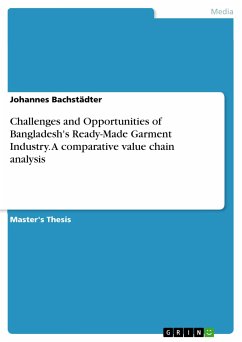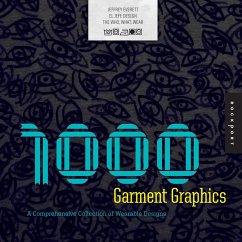
Challenges and Opportunities of Bangladesh's Ready-Made Garment Industry. A comparative value chain analysis (eBook, PDF)
Versandkostenfrei!
Sofort per Download lieferbar
Statt: 47,95 €**
36,99 €
inkl. MwSt. und vom Verlag festgesetzt.
**Preis der gedruckten Ausgabe (Broschiertes Buch)
Alle Infos zum eBook verschenkenWeitere Ausgaben:

PAYBACK Punkte
0 °P sammeln!
Master's Thesis from the year 2014 in the subject Design (Industry, Graphics, Fashion), grade: 1.3, RWTH Aachen University, language: English, abstract: The thesis explores the value chain of Bangladesh's ready-made garments industry at a crucial point: The link between internationally operating brands and retailers and locally operating garment manufacturers. The research problem arose from the discussions about the question who can bear which responsibilities for improving the working conditions in the sector. By illustrating the various differences in the buyer-producer relations, the autho...
Master's Thesis from the year 2014 in the subject Design (Industry, Graphics, Fashion), grade: 1.3, RWTH Aachen University, language: English, abstract: The thesis explores the value chain of Bangladesh's ready-made garments industry at a crucial point: The link between internationally operating brands and retailers and locally operating garment manufacturers. The research problem arose from the discussions about the question who can bear which responsibilities for improving the working conditions in the sector. By illustrating the various differences in the buyer-producer relations, the author sought to better understand the complex interdependencies of this network and thereby contribute to a better insight to aid all involved stakeholders to move the sector forward. Various types of relations between garment manufacturers and international buyers could be identied: Some manufacturers are relying on a wide choice of buying agents, buying houses and direct buyers. Other companies are producing mainly for direct buyers. The latter can benefit from a slightly higher profit margin but in both cases, the relations are based on oral contracts and the factories' capacity utilisation is subject to a great order fluctuation. A third and most noticeable group is characterized by very close ties to the buyers. These ties enable producers to re-negotiate order conditions in case of difficult circumstances and the first buyers are concluding long-term contracts with the manufacturers. The companies that rely on strong long-term contracts have a smaller profit margin but can manage their companies easier nevertheless because their capacity fluctuation is close to zero. At the same time, price and compliance pressure are stated as the most important challenges by the manufacturers. The enforcement of high standards on building and fire safety has become a number one topic in Bangladesh's RMG sector. According to a large part of the interviewed manufacturers, the regulations are rising too fast. They often complain about shrinking profit margins that would not allow them to invest in compliance. The international buyers on the other hand refer to the low productivity that should be raised by the manufacturers as a first step to gain more profitability. It can be concluded that the value chain of ready-made garments in Bangladesh shows eminent characteristics of a captive governance but there are several important distinctions to make within this category. The interviews showed evidence that the buyer-producer relations are developing towards a more cooperative relationship based on partnership. Editor's Note: Due to data privacy and the sensitiveness of certain information, parts of the thesis and appendix were removed.
Dieser Download kann aus rechtlichen Gründen nur mit Rechnungsadresse in A, B, BG, CY, CZ, D, DK, EW, E, FIN, F, GR, HR, H, IRL, I, LT, L, LR, M, NL, PL, P, R, S, SLO, SK ausgeliefert werden.













